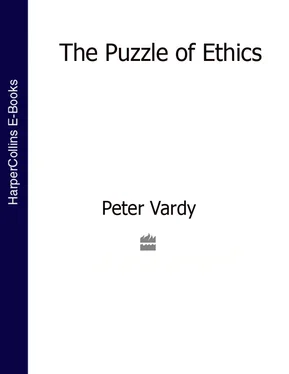Questions for discussion
1 What do you consider to be the most satisfactory solution to the Euthyphro dilemma?
2 Socrates considered that he was ignorant and yet he was wise. How should this be understood?
3 What are the strengths and weaknesses of Plato’s understanding of morality?
4 If I hold that the grass is green and you believe the same thing, how can Plato’s approach help to explain that we are both correctly seeing the same thing?
5 What point does Plato want to make in his parable of the Cave?
6 Why did Plato reject democracy? Do you think he was right to do so and why?
THREE
Aristotle and Virtue Theory
It would be difficult to begin an account of Aristotle’s moral theory without first saying something about where he stands in relation to Socrates and Plato. Socrates (470–400 B.C.), as has already been suggested, is generally regarded as the founding father of western philosophy. Although Socrates never wrote anything, or at least there is almost no evidence to point to his having done so, we know of his existence chiefly through the works of the comic dramatist Aristophanes (448–380 B.C.), the writer and historian Xenophon (430–355 B.C.) and particularly through the philosophical dialogues of Plato (427–347 B.C.). Plato was Socrates’ pupil for approximately ten years prior to Socrates’ death, and Aristotle became Plato’s pupil for roughly twenty years, studying under him at the famous Academy which Plato had established in Athens. These three, then, Socrates, Plato and Aristotle, may be referred to as the Three Greek Wise Men as, arguably, they laid the foundations for all philosophical inquiry. Although western philosophy has been described by A. N. Whitehead as merely footnotes to Plato, it is Aristotle to whom, perhaps, the greatest debt must be paid, for in Aristotle’s writings we find the rigorous and systematic treatment of philosophical questions in continuous prose argument, unlike the dramatic and often poetically beautiful dialogues of Plato. Aristotle’s Nicomachean Ethics is, effectively, the first major piece of sustained moral argument from a secular point of view.
Biography
Born in 384 B.C. in Stagyra, Macedonia, Aristotle was the son of Nicomachus, a wealthy and highly influential court physician to the king of Macedonia. At the age of eighteen Aristotle entered Plato’s Academy where he stayed for almost twenty years. Disappointed at not being given the leadership of the Academy upon Plato’s death, and becoming concerned for his own safety as a result of some racial hatred being whipped up against Macedonians, Aristotle left Athens and moved East. He found relative peace and security in the kingdom of Atarneus, in the Eastern Aegean. Here he married the king’s niece. In 343 B.C. he became tutor to Alexander, later Alexander the Great. According to Bertrand Russell it is inconceivable that Alexander thought anything of Aristotle other than that he was a ‘prosy old pedant’. Nonetheless, enjoying some political and financial support from the king, Aristotle returned to Athens in about 335 B.C. and founded his own school of philosophy, the Lyceum. However, upon Alexander’s early death in a far-flung Eastern campaign Aristotle went into voluntary exile ‘lest Athens should sin twice against philosophy’, that is, execute him as it had done Socrates. He died in Chalcis in 322 B.C. at the age of sixty-two, and his will, which survives relatively intact, suggests that he had led a happy and fulfilled life.
His influence has been enormous for he began sorting human knowledge and inquiry into the various categories and disciplines that we know and use today. He compiled the first ‘dictionary of philosophical terms’ and produced major works in logic (the Organon or Instrument ), in the physical sciences (the Physics, On the Heavens ), in the biological sciences ( The History of Animals, On the Parts of Animals ), in psychology ( On the Soul ), in politics ( Politics, The Constitution of Athens ) and in ethics ( Nicomachean Ethics, Eudemian Ethics ).
Ethics
The Nicomachean Ethics , generally regarded as the most detailed and coherent of Aristotle’s works on moral philosophy, is a collection of lectures compiled and edited by his son, also called Nicomachus after his grandfather. Consisting of ten books in all it describes the purpose of life, the divisions of the soul, and the various qualities of mind and character that are supposed to be necessary for moral conduct. It continues with a detailed description of friendship before concluding with the view that contemplation of the Good (that is, the life of philosophic reflection) is the highest form of happiness. For those not fully committed or suited to the life of pure contemplation then friendship becomes the ideal forum in which to exercise all of the virtues; the virtues being those moral and intellectual characteristics which have been fashioned by habit and education. Morality finds part of its true expression in friendship.
The purpose of life
In Book 1 of the Ethics, Aristotle makes a number of points concerning the true object or purpose of life. Firstly, he makes the seemingly obvious point that everything a person or a group does is directed towards some kind of an aim.
Every art and every investigation and similarly every action and pursuit is considered to aim at some good (all references are to Nicomachean Ethics translated by J. A. K. Thomson and revised by H. Tredennick, 1976, Penguin, p. 63).
This, of course, makes complete sense. Whatever we do there is a purpose in doing it although sometimes, of course, the purpose may not seem immediately clear nor apparent. Alternatively, there may be a purpose to what we do, but we may want to object to that purpose. There is even a purpose in having no purpose! We might just want to sit and relax without having any particular aim in mind. But our purpose here is simply to enjoy doing nothing.
Secondly, there are, according to Aristotle, ‘superior’ and ‘subordinate’ aims. So, for example, writing the first philosophy essay is subordinate to obtaining the final A level or degree qualification, and sharpening the pencil or filling the ink cartridge are yet further subordinate aims to writing the essay. The point is that we do one thing in order to accomplish the aim of another more important thing, and so on, almost ad infinitum. We say ‘almost ad infinitum’ because there must be one overall or final aim towards which everything else is directed. For Aristotle, that final aim is the Good ; not only the Good for oneself but the Good for all humanity.
If then, our activities have some end which we want for its own sake, and for the sake of which we want all the other ends … it is clear that this must be the Good, that is the supreme Good … (and) … Does it not follow then that a knowledge of the Good is of great importance to us for the conduct of our lives? (Moreover) … while it is desirable to secure what is good in the case of an individual, to do so in the case of a people or a state is something finer and more sublime (pp. 63–4).
Thirdly, that Supreme Good, for Aristotle, is defined as ‘Happiness”:
… what is the highest of all practical goods? Well, so far as the name goes, there is pretty general agreement. ‘It is happiness’ say both ordinary and cultured people (p. 66).
This, however, presents us with a problem. The problem is that because people differ from each other, there are therefore differing conceptions or versions of happiness. At root, according to Aristotle, there are three broad categories of people:
those who love pleasure;
those who love honour,
those who love contemplation.
There are, then, lives given over to wine, women (or men!) and song; lives expressed in constant service to the community; and lives devoted to thinking Aristotle places the life of the politician in the second category (as someone who is always trying to find practical solutions to large- and small-scale problems); the life of a philosopher inevitably falls in the third category whereas most people, it seems, would prefer to live a life of pleasure:
Читать дальше












